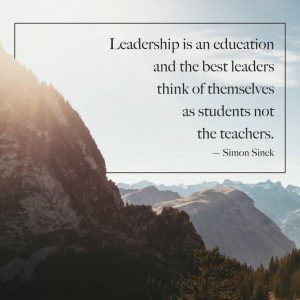Leaders do! They lead by doing! Take a look at their work plans and it is evident that they work diligently in leading their organizations. For many years now, I’ve met with our school and system leaders to review their professional growth plans. Invariably, I get a great plan from them, carefully outlining the work they would be pursuing in the coming year to improve their school or department. It took a fair amount of effort for me to refocus their plans from what they were going to do or lead to what they were going to learn. That effort has not been lost on me as I try to communicate a growth plan rather than a work plan to my own Board of Trustees.
I often believe that we get so busy leading that we forget to learn. We work so hard at implementing ideas, building collaborative environments and searching for innovative practices that we forget the importance of learning ourselves. It is not because we have become satisfied with being learned, it is that we are typically too damn busy leading! But wait, aren’t we constantly asking our staffs to be learners and if that is our request, then shouldn’t we be role models of learning?
This visual came across my Twitter feed this morning and speaks exactly to what I mean. Leaders, the very best leaders need to be learners at all times and in all occasions. Simply “doing” is not good enough and even more frightening is an ego based belief that we don’t need to know anything more. No matter your talent, you will hit a plateau (and sometimes a pretty low plateau) if you are not constantly learning to be a better leader.
“In times of change, learners inherit the earth while the learned find themselves beautifully equipped to deal with a world that no longer exists.” – Eric Hoffer
Leadership practice has changed considerably over the last number decades. The days of intimidation, threats and unilateral decision making “should be” almost extinct, even if a certain president continues that practice. Just as coaches have a different athlete today, leaders have different employees who will not or should not follow simply because they’ve been told. What we may have done years ago (learned) may not be overly successful in our current environments. The result is that leaders must strike the balance in the work they do (leading) and their own personal growth (learning).
This year, we’ve been able to utilize a Practice Profile based on competencies for both our school and system leaders. A set of indicators has been provided and individual leaders are also able to add indicators based on their own practice. An indicator in our standards document is defined as, “actions that are likely to lead to the achievement of a competency and which, together with the competency, are measurable and observable.” (Alberta Education Leadership Quality Standard) From there, they are able to be reflective on their own evidence in practice leading to potential areas of growth that are generally self selected.
Leading and learning are intertwined for leaders and without equal focus on both, neither will be exceptional. Excellent organizations require excellent leaders and excellent leaders need to be committed learners.


2 Comments
This says it all! I always appreciated when there was change in curriculum or in my teaching assignment for this very reason…
And last year when I was elected as Board Chair I felt both appreciative & apprehensive about the role…
I guess that’s God’s way of making us life-long learners!!
Change is good! And so is this blog!!
Judy
Author
Thanks Judy!